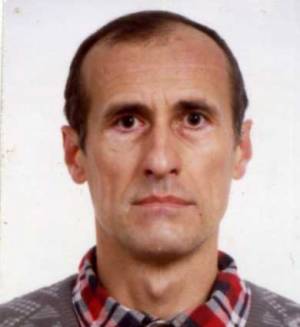Worker, dissident. Attempted to leave the USSR. A victim of punitive psychiatry.
In 1933, the Alifanov family fled the famine on foot from Sloboda Ukraine to the Donbas. Oleh graduated from high school. From 1972-74, he served in the border troops on the Soviet-Iranian border in Azerbaijan. After demobilization, from 1975, he worked in Moscow as an electric welder and a construction worker. He witnessed theft, padding of figures, and contradictions between communist propaganda and reality. In 1979, he was the only one in his brigade to condemn the occupation of Afghanistan. He was called a “traitor” for the first time. He studied for six months in preparatory courses for admission to the philosophy department of Moscow University, but the prospect of becoming a teacher of “scientific communism” did not appeal to him. After all, his critical views on the existing system had already been formed.
Tired of personal problems and life in Moscow dormitories, he returned to the village of Shevchenko in the Donetsk Oblast, where his grandmother lived. Having a lot of free time, he began to read Russian classics—Dostoevsky, Chekhov, Tolstoy—and listen to broadcasts from Radio Liberty and Voice of America. A spiritual awakening occurred: from an ordinary Soviet citizen, crushed by Soviet ideology, he became a dissident. Once, while listening to Radio Liberty, Alifanov became convinced that protests against the Soviet regime would have a greater effect if they were made not only by intellectuals but also by ordinary people—workers and peasants. Alifanov wrote an open letter to the Central Committee of the CPSU with a rather tolerant critique of the Soviet regime. In July 1985, during the International Youth and Student Festival in Moscow, he came to Moscow. He sent one copy of the letter by mail and decided to hand the second to the staff of a Western embassy for publication. For several days he wandered around Moscow, trying to get into an embassy, but the tight security around the embassies prevented him from carrying out his plan.
On July 30, 1985, Alifanov was sitting in a café across from the French embassy, observing it. He noticed that he was also being watched by men in gray suits sitting at neighboring tables and realized that he had to make a break for it immediately, or the KGB would catch him before he could act and his idea would fail. Leaving the café and walking along the embassy fence, he saw that the policeman in the booth was distracted by a phone call. Alifanov quickly grabbed the metal fence, pulled himself up, vaulted over the 3-meter fence, and thus escaped from the USSR for a few hours. The embassy staff were extremely surprised by his sudden appearance and said that the ambassador was not there, and only he could decide on granting Alifanov the political asylum he had requested.
At that time, the KGB and the police surrounded the embassy with a reinforced cordon. A colonel from the MVD demanded that the diplomats immediately hand over the “dangerous criminal.” Meanwhile, the diplomats took Oleh into the embassy building, fed him, talked with him, took his letter, and assured him that they would pass it on to the West. According to Alifanov, they were polite, friendly, and correct. They asked about his plans. Oleh said that he would leave the embassy at 9 p.m. The diplomats were satisfied with this answer and said they would not forget him and would follow his fate. At 9 p.m., after 6 hours in the embassy, Alifanov, accompanied by a French diplomat named Stefan, left the embassy. The diplomat walked him to the Oktyabrskaya metro station and said goodbye. In the metro station lobby, KGB agents arrested Alifanov and took him to the nearest police station, where they began to interrogate him. At first, they threatened him with violence, then a high-ranking KGB officer arrived and questioned Alifanov about the layout of the embassy and the number of employees.
After the interrogation, Alifanov was taken to the Kashchenko Psychiatric Hospital in Moscow, where they told him he would die in a psychiatric hospital. After giving him the standard diagnosis of “sluggish schizophrenia,” they began to inject him with neuroleptics.
Meanwhile, the French diplomats kept their word: his letter was published in the Parisian newspaper “Le Matin” and caused a huge resonance in the West. The text of the letter was broadcast by Radio Liberty and Voice of America. Alifanov had achieved his goal.
Two months later, he was transferred to a psychiatric hospital in the village of Vinzili near Tyumen, closer to his mother, who lived in Surgut. The regime here was much milder.
After three months of confinement, Alifanov was released, probably with the help of the French. He worked as a laborer in Donetsk, then moved to the village of Shevchenko, where he lives to this day. The sense of justice that led him to his legendary breakthrough into the embassy prompted him to appeal to Amnesty International and the heads of other states with petitions for the release of other political prisoners. He wrote letters to newspapers about current public affairs.
Author: Oleg Sofianyk
2012

ALIFANOV OLEH VOLODYMYROVYCH